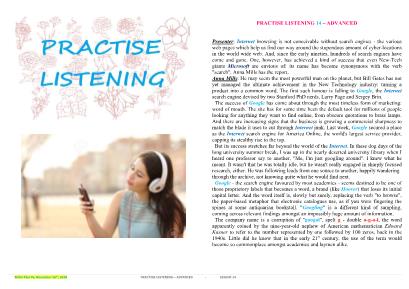Bài thực hành nghe Tiếng Anh nâng cao - Bài 14 - Thẩm Tâm Vy - Năm 2018 (Có âm thanh)
Bạn đang xem tài liệu "Bài thực hành nghe Tiếng Anh nâng cao - Bài 14 - Thẩm Tâm Vy - Năm 2018 (Có âm thanh)", để tải tài liệu gốc về máy bạn click vào nút DOWNLOAD ở trên

Thẩm Tâm Vy, November 16th, 2018 PRACTISE LISTENING – ADVANCED - LESSON 14 PRACTISE LISTENING 14 – ADVANCED Presenter: Internet browsing is not conceivable without search engines - the various web pages which help us find our way around the stupendous amount of cyber-locations in the world wide web. And, since the early nineties, hundreds of search engines have come and gone. One, however, has achieved a kind of success that even New-Tech giants Microsoft are envious of: its name has become synonymous with the verb "search". Anna Mills has the report. Anna Mills: He may seem the most powerful man on the planet, but Bill Gates has not yet managed the ultimate achievement in the New Technology industry: turning a product into a common word. The first such honour is falling to Google, the Internet search engine devised by two Stanford PhD nerds, Larry Page and Sergey Brin. The success of Google has come about through the most timeless form of marketing: word of mouth. The site has for some time been the default tool for millions of people looking for anything they want to find online, from obscure quotations to brass lamps. And there are increasing signs that the business is growing a commercial sharpness to match the blade it uses to cut through Internet junk. Last week, Google secured a place as the Internet search engine for America Online, the world's largest service provider, capping its stealthy rise to the top. But its success stretches far beyond the world of the Internet. In these dog days of the long university summer break, I was up in the nearly deserted university library when I heard one professor say to another, "Me, I'm just googling around". I knew what he meant. It wasn't that he was totally idle, but he wasn't really engaged in sharply focused research, either. He was following leads from one source to another, happily wandering through the archive, not knowing quite what he would find next. Google - the search engine favoured by most academics - seems destined to be one of those proprietory labels that becomes a word, a brand (like Hoover) that loses its initial capital letter. And the word itself is, slowly but surely, replacing the verb "to browse", the paper-based metaphor that electronic catalogues use, as if you were fingering the spines at some antiquarian bookstall. "Googling" is a different kind of sampling, coming across relevant findings amongst an impossibly huge amount of information. The company name is a corruption of "googol", spelt g - double o-g-o-l, the word apparently coined by the nine-year-old nephew of American mathematician Edward Kasner to refer to the number represented by one followed by 100 zeros, back in the 1940s. Little did he know that in the early 21 st century, the use of the term would become so commonplace amongst academics and laymen alike.
Tài liệu đính kèm:
 bai_thuc_hanh_nghe_tieng_anh_nang_cao_bai_14_tham_tam_vy_nam.pdf
bai_thuc_hanh_nghe_tieng_anh_nang_cao_bai_14_tham_tam_vy_nam.pdf 01. LISTENING 14 (Slow).mp3
01. LISTENING 14 (Slow).mp3 02. LISTENING 14 (Normal).mp3
02. LISTENING 14 (Normal).mp3





